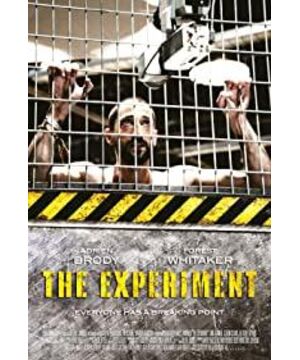Date: 2010
Country: United States
Director: Paul Scheuring
Starring: Adrien Brody Adrien Brody
has seen the case of 'Stanford Prison Experiment' in more than one book, so, in the long, unfamiliar When I saw this film on the Psychology Movie List, I felt like a familiar stranger, and I felt that I needed to watch it anyway, and then make those scenes described in the book more vivid!
Stock up on some basics before watching the movie:
– Philip George Zimbardo, American psychologist, emeritus professor at Stanford University, known for his Stanford Prison Experiment and writing college psychology textbooks. In 2008, the old gentleman also had the evolution of TED TALK, about how ordinary people become devils or heroes
- Stanford Prison Experiment: In 1971, Zimbardo was hired as a professor of psychology at Stanford University. There he conducted the famous Stanford Prison Experiment, randomly assigning 24 Teachers College students to act as "prisoners" and "guards" in a mock prison located in the basement of the Stanford Psychology Department building (six college students as prisoners and The guard's alternate, did not participate in the experiment). These students quickly enter their roles, with the "guardian" showing a sadistic pathological personality, and the "prisoner" showing extreme passivity and depression. Prisoners and guards quickly adapt to their roles, step by step beyond pre-set boundaries, leading to dangerous and psychologically damaging situations. A third of the guards were rated as displaying "true" sadistic tendencies, while many prisoners were emotionally traumatized, with two having to withdraw from the experiment early. In order to prevent the damage from expanding, the two-week experiment had to be terminated early after a week.
– The Lucifer Effect: It is a book published by Philip Zimbardo in 2007. The Lucifer effect refers to the way of thinking, behavior, and human character in a specific situation or atmosphere, showing the evil side, which reflects human nature The "evil" in the book can be artificially created in a specific situation or caused directly by the situation. In the book, Zimbardo describes the Stanford Prison Experiment in detail for the first time, and provides a social psychological explanation for the phenomenon of American prison guards abusing prisoners in the Abu Ghraib Prison Abuse Case.
-------------------------------------------------- --------------------------------
If you don't know the real background of the whole experiment, just watching the movie will be very interesting The feeling of getting off track! In the
movie, a group of people, for money, participate in an experiment in a real prison. They were divided into two groups and played two roles - guards and prisoners.
Initially, the boundaries between guards and prisoners were not so clear, only reflected in clothing. Everyone is peaceful, calm, individual, friendly... In short, they are normal.
Then, it started to look like a real guard and a real prisoner.
The guards resolutely obey the established rules of the game, and fully believe in the authority of the rules!
The prisoners were not allowed to have any physical contact with the guards, so the guards punished the offenders by doing push-ups, collectively;
the prisoners were not allowed to have leftovers, so the guards attacked at night, handcuffed the leader in front of the cell door, and gave the provocateurs a look;
…
In the process, the guards used their rights and felt their rights, and gradually entered their roles, feeling that they were the real guards, and the prisoners were prisoners.
And so, the war between guards and prisoners really begins:
compassion slowly degenerates, the guards will ignore the diabetic prisoner;
morality slowly degenerates, the guards catch the prisoner, shave his hair, urinate on his face, only To keep him honest;
Humanity slowly degenerates, the guard insults the prisoner, makes the prisoner give him oral sex; the guard presses the prisoner's head in the toilet, makes the prisoner say 'I'm a prisoner'...
The devil, was released, the guard, used violence, right His own companion, just because he has sympathy for the prisoner, he actually challenges the right;
the devil, out of control, guards, uses violence, against the prisoner, in the conflict, let one of them kill with one blow....
Then
, the prisoner Nor are they peaceful, calm, or obedient.
They resisted, very frantically, very irrationally, using violence, against the guards, the kind of violence that wanted to kill the other party.
By this time, the whole experiment was out of control.
Everyone is still human, but they are not human anymore. It is okay to say that they are devils!
In this experiment, about human nature, situation, and demons, there is no winner, everyone is more or less injured, not just the body!
Many people say that this movie is about human nature, good and evil, good people and bad people.
Just watching a movie, it seems like this, everyone has a devil in their heart, but many times it is locked up by you, and once it is released, it will be devastating.
Such a statement always feels far-fetched.
I still believe that there is a difference between good people and bad people. Good people are insulted, bullied, and the violence that erupts when they are hurt is just a way to save themselves physically; and the traits that bad people show are fundamentally inhumane In fact, the characteristics of the essence are the essence, because the essence is so, so the performance is so.
So, it's not just the difference between inner demons, but the difference between good and evil in nature, right? !
-------------------------------------------------- --------------------------------
Having seen Zimbardo's speech on TED, he believes that the transformation of good and evil in many cases is not as simple as being a good person or a bad person, but rather depends on the environment and mechanism of people's survival.
If you want to change a person, you have to change the situation, you have to change the situation, you have to know where the rights exist in the system.
To turn a good person into a bad person does not require any drugs. It only requires seven social processes to make evil gradually arise: including dehumanizing others, depersonalizing oneself, shirking personal responsibility, blindly obeying authority, not Discerning conforms to group norms, stands idly by, is indifferent, and passively tolerates bad behavior. And these processes are easy to occur in new or unfamiliar environments, people's habitual reactions will fail, and the corresponding personality and moral sense will also be closed!
It turns out that personality and morality are also closed? Is it like a switch between vampire human nature and demon nature?
In order to keep myself from harm, I chose to close everything, numbness, indifference, and indifference to being a devil! ! !
Born as a human being, in this life, the most difficult thing to understand is the human being! !
-------------------------------------------------- -------------------------------
BTW, Paul Scheuring turned out to be the director of "Prison Break"... no
wonder the prisoners were filmed It's very touching, especially the last scene, everyone is sitting on the road, waiting for the car to come, the beauty is like a decadent poem! ! !
It's been a long time since I wrote a movie review, I'm tired!
2015.11.22 NANA
View more about The Experiment reviews











